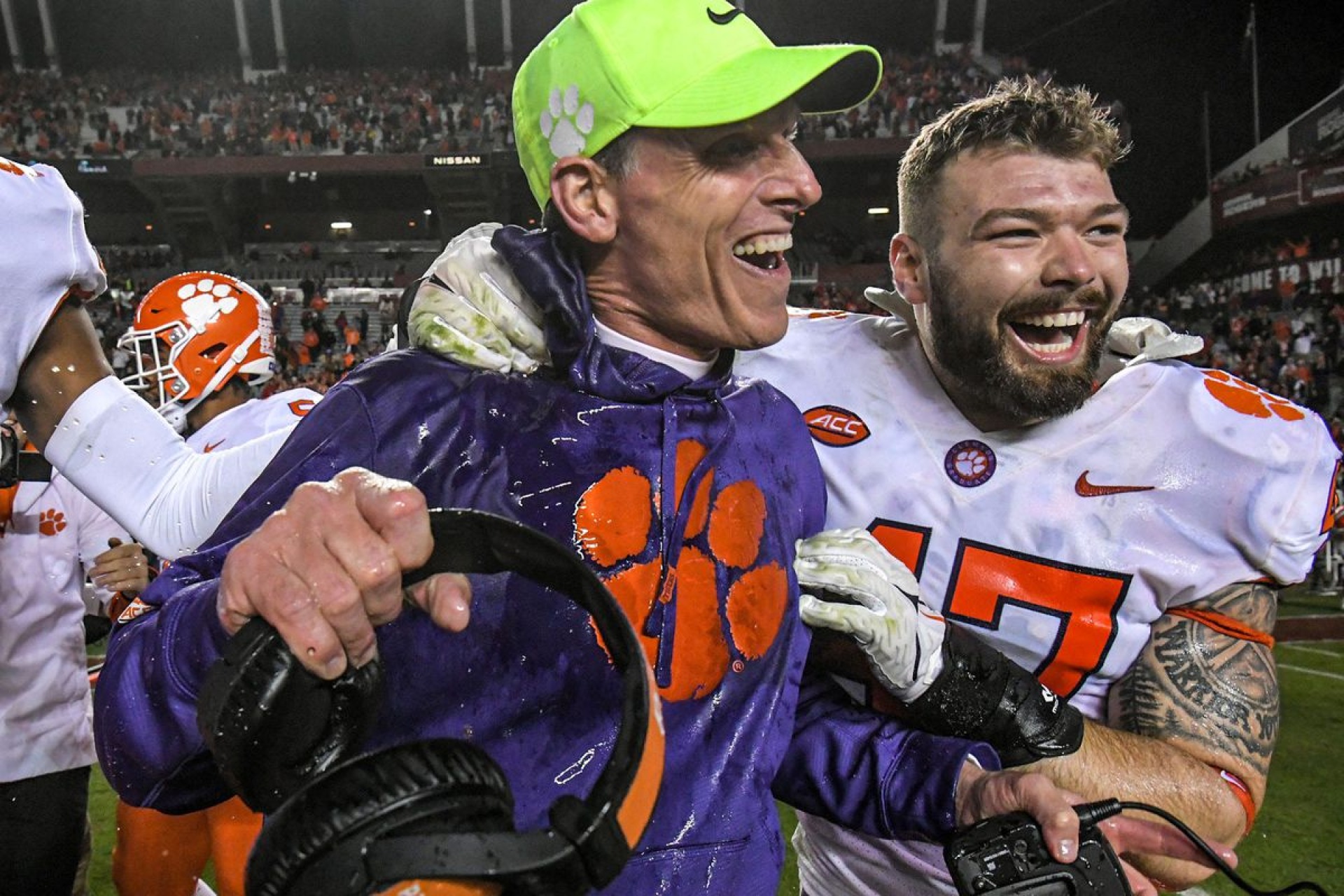
By William Qualkinbush
For ten seasons, Clemson football has enjoyed a period of unrivaled stability atop college football.
Sure, several coaches have pursued (presumably) greener pastures during that stretch of time on both sides of the football. The period of purgatory between one hire and the next is generally rife with speculation and uncertainty. In each case, the argument for continued success was an easy one.
Clemson still had Brent Venables.
It is impossible to divest Venables from the most successful decade in Clemson football history. In fact, one might exalt him to the very top of the list of reasons why Tiger fans have enjoyed two national titles, six consecutive playoff appearances and ACC titles, and a conveyor belt of first-round picks, pro players, and collegiate legends over the past ten seasons.
Clemson’s defensive results under Venables speak for themselves. Simply put, his units didn’t give up points, or yards, or first downs. Barring a bowl game collapse, his last eight groups will finish inside the top 15 nationally in yards per game allowed.
Since 2012, Clemson has lapped the field many times over in sacks and tackles for loss. Venables’ unit led the nation in tackles for loss in four consecutive years (2013-2016) and led the nation in sacks three times. Thirty percent of the drives during which he called defensive plays for Clemson resulted in three-and-outs, best in the country.
Over the past four seasons, Venables’ defenses have allowed less than one point per possession. That’s an absurd, unheard-of rate of conversion that seems impossible in the high-octane era of offense we currently inhabit. Just this year, as Clemson’s offensive struggles placed the burden of winning on the defense more than ever before, Venables’ crew held opponents out of the end zone in five of the Tigers’ 12 games.
All the while, Brent Venables became somewhat of a caricature, the epitome of what a modern defensive coordinator was supposed to be. His high-wire act balancing the cerebral and the charismatic was lauded during every television broadcast. A guy who requires a get-back coach to keep from drawing a penalty flag that can also find and predict a two-point conversion play while watching film on his opponent from years prior on the night before a game is a rare breed, indeed.
He became legendary for his desire to wait until the last possible second to adjust to an offense’s adjustment, a characteristic that has drawn criticism from time to time but certainly sets him apart. During his time at Clemson, he managed to figure out and routinely thwart the two most unique offenses the ACC has seen: Paul Johnson’s option at Georgia Tech and Dave Clawson’s long mesh offense at Wake Forest.
Eight of Venables’ players have been first round NFL draft picks. 28 of them have been drafted altogether. His genius was not only related to X’s and O’s, but he found a way to build strong bonds with his players in the process of putting them in position to be successful. That can be a hard thing for a coach, but Venables seemed to pull that dance off effortlessly each and every season.
And we haven’t even gotten to the games. No one besides perhaps Nick Saban himself has engineered more 60-minute masterpieces than Venables in the modern era of football. The list is long and spans his entire tenure. Among them:
- Held LSU to 219 yards and 9 first downs, including a critical late-game stop, in the “4th & 16” Peach Bowl win in 2012
- Forced four turnovers against Ohio State in the 2013 Orange Bowl victory, the first BCS bowl win in Clemson history
- Held Oklahoma to six points in the 2014 Russell Athletic Bowl and shut the Sooners out in the second half of the 2015 Orange Bowl
- Presided over half of the 56-7 dismantling of South Carolina and shut out Ohio State in the 2016 Fiesta Bowl
- Destroyed Miami’s hopes and dreams in an ACC championship game beatdown in 2017
- Allowed just 19 points in two playoff wins against Notre Dame and Alabama in 2018, including perhaps the greatest defensive showing in the CFP era in the 44-16 demolition of the Crimson Tide
- Held a historically great Ohio State offense to 24 points in a national semifinal in 2019
- Pounded Ian Book in a revenge game to beat Notre Dame in the ACC title game in 2020
- Shut out South Carolina 30-0 and held Georgia to three offensive points in 2021
And we haven’t even begun to list the goal line stands (2014 Louisville, 2015 Notre Dame, 2016 Louisville, 2019 North Carolina, 2021 Georgia Tech/Louisville) and late turnovers (2013 Ohio State, 2015 Louisville, 2016 NC State, 2019 Ohio State, 2021 Boston College) that his defenses pulled off. Surely there are more–that was just an off-the-top-of-my-head exercise.)
A common theme in these games is impossible to ignore: The bigger the game, the bigger the moment, the better the defense.
Now, there have certainly been some rough patches. Don’t think for a second we aren’t considering the times when Clemson was outmanned or out-schemed on rare occasions. They stick out too, but that in and of itself is evidence of Venables’ greatness. It is much easier to count tremendous performances that led directly to achievements than it is to count times when the defense cost Clemson something of value.
The 44-16 win over Alabama is no doubt the peak of the Dabo Swinney era at Clemson. It is perhaps only rivaled by one moment in Brent Venables’ career–a 13-2 win over a historically great Florida State offense to win the 2000 national championship for Oklahoma.
Which brings us to the Sooners.
Only one active coordinator in the country has been anywhere longer than Venables has been at Clemson. He has turned down offers from countless programs over the years, opting instead to keep his family in Tigertown and to pursue excellence as the defensive coordinator here.
Just as he was loyal to Bob Stoops and Oklahoma until he left in 2012, Venables has been uncommonly loyal to Clemson. He has spoken several times about the culture at Clemson and how it has helped him become a better coach, leader, husband, and father. He would likely tell you that he was perfectly content being the Clemson defensive coordinator for the remainder of his career.
No one can blame Venables for taking his shot at running Oklahoma football and leading the program into a new era as it moves from the Big 12 to the SEC. He provided Clemson with the best years of his career and made it into a destination for top recruits across the country on the defensive side of the ball.
Brent Venables gave Clemson everything he had. In the same way, Clemson gave Brent Venables everything it had, too.
Venables came to Clemson after the Tigers gave up 70 points in the 2011 Orange Bowl. Dabo Swinney desperately needed an upgrade after an embarrassing postseason display that punctuated a late-season swoon.
Meanwhile, in Norman, Venables’ last two defenses at Oklahoma ranked outside the top 30 of the country in yards per play allowed. His 2011 unit ranked 38th. Many Sooner backers thought his best days were behind him. It’s safe to say his career was in an uncertain place, too.
Those same fans lined up at the airport on Sunday night to cheer his arrival as their new head coach. This was made possible because of the mutually beneficial relationship between Clemson and its decade-long defensive coordinator, with Dabo Swinney bringing in a talented coach in need of a reset and that coach establishing the nation’s premier defensive operation on his staff.
Win-win.
Best of luck to Brent and his family in Norman.










